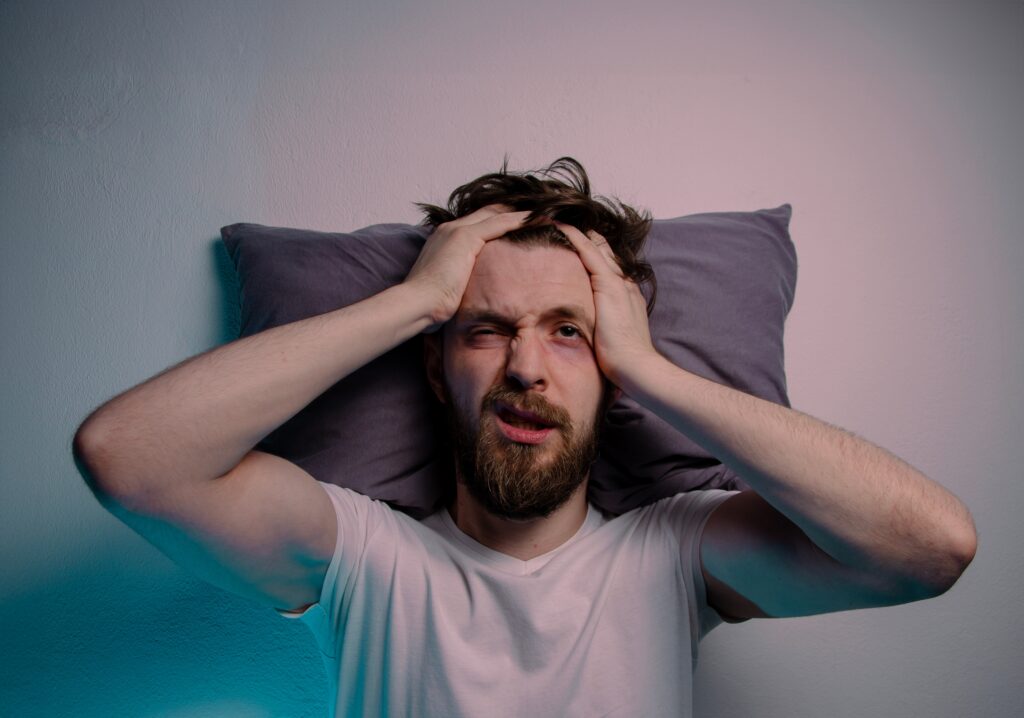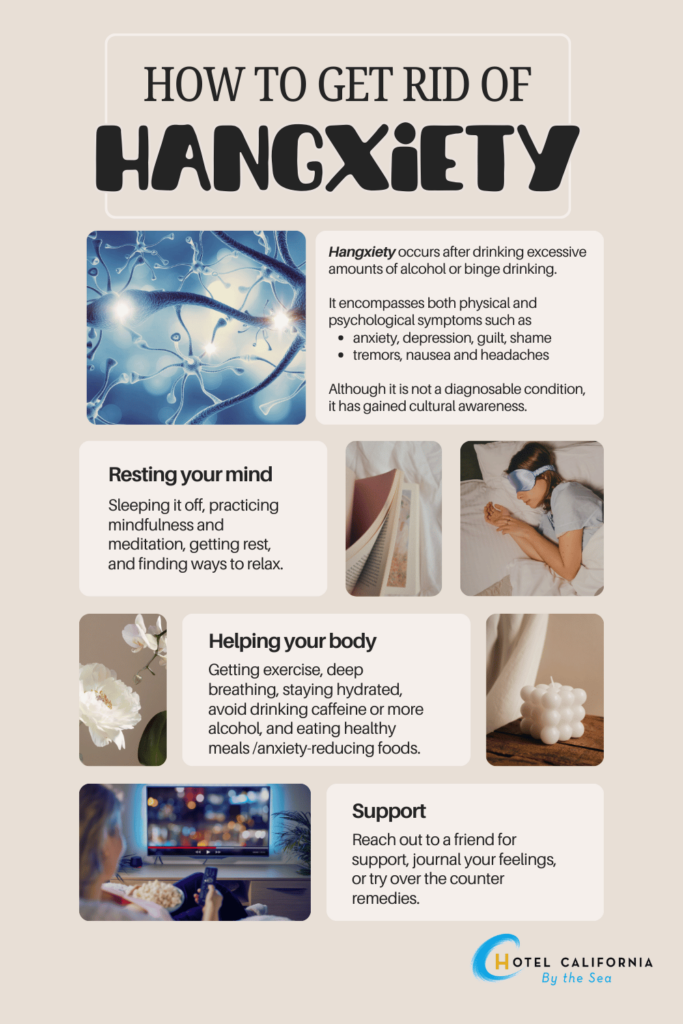How to get rid of Hangxiety
Hangover anxiety. Also known as hangxiety. A night of excess drinking can leave your head pounding. It leaves you feeling weak and nauseated the next day. You may also feel a sense of dread, anxiety and guilt. The combination of both physical and psychological feelings after drinking is hangxiety. This is not a new concept. However, it is now finally being socially recognized as a condition related to mental health and behavioral health.

According to the Journal of Clinical Medicine, research found that an estimated 12% of people experience anxiety as a part of their hangover symptoms. Hangxiety is a cultural term that clinical professionals are now using to describe the aftermath of drinking. It has become a catch-all term to describe the psychological effects of a hangover. It’s a hangover with a side of anxiety.
What is Hangxiety?
Hangxeity is characterized by feelings of regret, shame or guilt about what you may have said or done the night before while you were drinking alcohol. Hangxiety is also both the mental and physical symptoms that can manifest due to these feelings. Hangxiety is not a clinical diagnosis. There is no single cause of this phenomenon. And there is no cure.
A hangover is a form of mild alcohol withdrawal. When anxiety becomes a persistent symptom of alcohol withdrawal, it is known as hangxiety. In some cases, hangxiety can be caused by specific situations. Drunk decisions often lead to feelings of regret. And if a person has made poor decisions while under the influence of alcohol, the shame and guilt can produce hangxiety.
Some studies on hangxiety have found that it significantly impacts those who are very shy. A 2019 study published in Personality and Individual Differences found that hangxiety, after a night of drinking, was more prevalent in timid people or people who suffered from social anxiety. The hypothesis behind this phenomenon is that highly shy people often turn to alcohol to help them overcome their social anxiety. Those people drank more resulting in temporary reprieve from anxiety. However, during the aftermath the next day, as alcohol is detoxing from the body, the feelings of anxiety return and can be even worse.

Causes of Hangxiety
- Brain abnormalities – The psychological link between the GABA neurotransmitter and alcohol impacts the brain when drinking alcohol. GABA chemicals impair judgment during alcohol consumption, resulting in actions that can contribute to excessive fear, anxiety, panic, stress and other negative emotions.
- Social anxiety – Studies show that an estimated 5 million adults in the US struggle with social anxiety disorder. Some people with this condition often turn to alcohol to feel more confident or comfortable in social situations. This can lead to excess drinking, resulting in hangovers the next day and make you feel even more anxious as the effects of alcohol wear off.
- Emotional withdrawal – When alcohol consumption stops and you begin detoxing, it can chemically alter your brain chemistry as the brain works to rebalance itself. Endorphins are the body’s natural painkillers. They are feel-good hormones released in response to traumatic events. Drinking alcohol can trigger the release of endorphins. When drinking has stopped, the sudden drop of endorphin levels can cause a person to experience feelings of emotional instability.
- Alcohol detox and withdrawal – During the detox phase when alcohol is no longer present in the system, the body can experience both physical and emotional symptoms such as tremors, anxiety and depression.
- Low alcohol tolerance – When there is a rise in blood alcohol concentration in the body, it can bring on symptoms of intoxication very quickly in a person who is excessively drinking. This is also referred to as having an alcohol allergy, where it can cause symptoms of nausea, rapid heartbeat, head pain and fatigue.
- Regret and worry – A person may have been so intoxicated that they might have done or said things they wouldn’t normally do. This can lead to feelings of guilt about it the following day.
- Dehydration – Alcohol is a diuretic. The more you drink, the more dehydrated you become. Dehydration can impact physical and psychological changes in the body.
- Poor sleep – Drinking alcohol hinders your quality of sleep. And if you already have anxiety, a night after drinking can make your mental illness worse. Poor sleep quality can make it difficult to make sound decisions, complete simple tasks and impair concentration.
- Folic acid deficiency – Chronic alcohol use can lead to deficient levels of vitamin B9. This occurs in about 80% of people with alcohol use disorder. When you are consuming alcohol excessively or on a regular basis, you are not getting enough nutrients. It can also make you indulge in foods that can trigger anxious feelings.
- Hormone fluctuations – When drinking alcohol, it releases the hormone endorphins. When alcohol is removed and the brain is working to return to baseline, it can trigger the stress hormone cortisol, leaving you feeling anxious and panicky.
Check Your Insurance Coverage for FREE
Find out if your insurance covers addiction treatment in minutes. We accept most insurance!
Symptoms of Hangxiety
- Headache
- Nausea
- Difficulty concentrating
- Irritability
- Worry
- Inability to sleep or sleep problems
- Inability to relax
- Feelings of shame
- Feelings of regret
- Feelings of guilt
- Feelings of overwhelm
- Racing heart
- Panic attack
- Paranoia
- Gastrointestinal issues
- Rumination about past events
How long does Hangxiety last?
The duration of a person’s hangxiety usually lasts for a day or two. However, there are cases where symptoms of anxiety disorder can last up to 6 months after. Hangxiety is more likely to affect those who are naturally anxious, have a history of anxiety disorders or have a family history of mental illness.
Anxiety can impact various aspects of life, including work and relationships. Hangxiety is a type of everyday anxiety that people experience from time to time when they are sobering up from a night of heavy drinking. It is more temporary and will subside over time.
The duration of hangxiety symptoms is also impacted by age, alcohol tolerance, hydration, body weight and any medications that the person may be taking at the time. All of these factors are important in contributing to how long hangxiety lasts. Each individual has their own timeline of how long it can take their body to rebalance their hormones and neurotransmitters after it has been disrupted by alcohol use.
How to get rid of Hangxiety
- Stay hydrated
- Take deep breaths
- Eat anxiety-reducing foods or a healthy meal
- Practice mindfulness and meditation
- Sleep it off
- Get some exercise
- Find ways to relax
- Try over the counter remedies
- Avoid drinking more alcohol
- Avoid caffeine
- Reach out to a friend for support
- Journal down your feelings to put them into perspective
Reach out to Hotel California by the Sea
We specialize in treating addiction and other co-occurring disorders, such as PTSD. Our Admissions specialists are available to walk you through the best options for treating your addiction.
Treatment for Alcohol Use Disorder
Hangxiety is a mental health phenomenon that occurs after drinking alcohol. It encompasses both physical and psychological symptoms such as anxiety, depression, guilt, shame, tremors, nausea and headaches. It is not a clinically diagnosable condition, but it has gained more cultural awareness. Excessive drinking and binge drinking often cause feelings of hangxiety the next day as the body attempts to rebalance after detoxing from alcohol.
Professional behavioral health treatment programs such as Hotel California by the Sea provide clients with the tools, resources and support needed to overcome their negative drinking habits that often lead to hangxiety. We offer treatment at all levels of care, including detox, residential, PHP and IOP. We utilize evidence-based treatment methods such as CBT, DBT and EMDR therapy. Hotel California by the Sea is dedicated to helping clients reach their goals in sobriety and overcome their addiction.
References:
https://www.everydayhealth.com/emotional-health/what-is-hangxiety-plus-tips-for-getting-rid-of-it
https://www.healthline.com/health/hangover-anxiety
https://www.choosingtherapy.com/hangxiety
https://www.womenshealthmag.com/health/a30391821/hangover-anxiety
https://www.usatoday.com/story/life/health-wellness/2022/12/30/hangxiety-meaning-cure/10960245002
